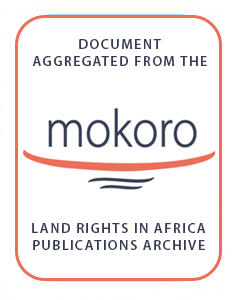Location
Mokoro is pleased to host the ’Land Rights in Africa’ site as a contribution to the land rights dialogue and related debates. This website was created in January 2000 by Robin Palmer, and was originally housed by Oxfam GB, where Robin worked as a Land Rights Adviser. A library of resources on land rights in Africa – with a particular focus on women’s land rights and on the impact of land grabbing in Africa – the portal has been well received by practitioners, researchers and policy makers, and has grown considerably over the years. Since 2012, Mokoro has been hosting and maintaining the site.
The views expressed on the Land Rights in Africa site as well as the publications hosted there, are those of the authors and do not represent those of Mokoro. Wherever possible, we link to the source website of publications.
Members:
Resources
Displaying 846 - 850 of 1134The Efficacy of establishing a National Land Commission for Land Administration in Kenya
Includes conceptualising land administration; land administration systems in Africa; the Kenyan situation; re-engineering the land administration function in Kenya – redefining the goal of land administration; establishing a National Land Commission; implementation and operationalisation of the proposed land administration structure.
Report of the Conference on Land Tenure and Conflict in Africa: Prevention, Mitigation and Reconstruction, 9-10 December 2004
The conference was part of a series of activities by ACTS seeking to improve knowledge on the links between natural resources and violent conflict. Includes full conference papers on Burundi, Eastern DRC, Rwanda, Kenya, Sudan, Somalia, Zimbabwe, North Kivu, as well as overview papers on a research agenda on land tenure and land reform, human-centred environmental security, Oxfam GB and land in post-conflict situations in Africa, and group discussion reports, conclusions, references.
The new Tragedy of the Commons
Asks how can poor people protect their land rights? Stresses importance of land in the social, economic and political life of Africa and fact that land is contested all over Africa, with women’s rights particularly at risk. Land registration is inaccessible to most. African governments have often muddied the water, with land frequently used to reward political loyalty. The commons are especially important for poorer people, but everywhere are under growing pressure as privatisation and enclosure continue.
Critical Pastoral Issues and Policy Statements for the National Land Policy in Uganda
Includes the pastoral land question – recognition in law and policy, establishment of protected areas, access and ownership of land, land use and sustainability. Pastoral rights in policy – international research and regional developments, conceptual framework for the Policy, Policy goal, principles and objectives – land and sustainable livelihoods, land tenure, land markets, land administration, land use and management, natural resources and environment.
The Ndungu Report: Land & Graft in Kenya
This summary of the Report of the Ndungu Commission on Illegal and Irregular Allocation of Public Land provides an insight into a critical recent episode in the struggles over land and graft in Kenya. Includes land and demography in Kenya; the law relating to the allocation of land; the Commission’s findings – (1) urban, state and ministries’ land, (2) settlement schemes and trust lands, (3) forest lands, national parks, wetlands, riparian resources and protected areas; the Commission’s recommendations; commentary.




